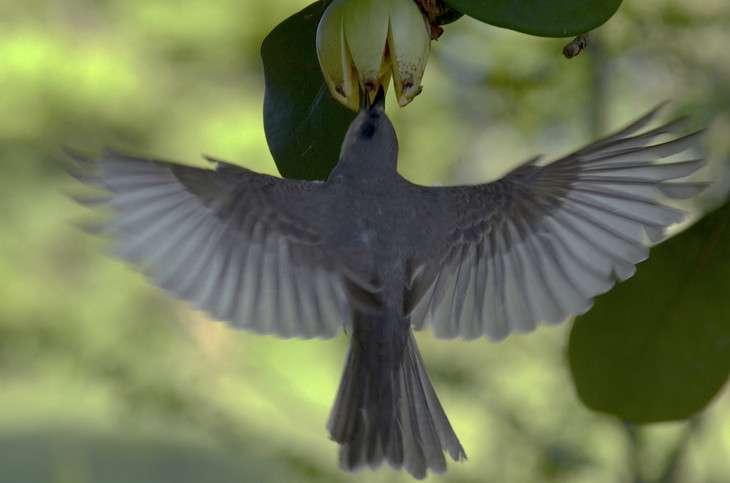Birds maintain rare plant species, study finds

Outside of human influences, why do rare plant species persist instead of dwindling away to extinction? It's a question that has plagued ecologists for centuries. Now, for the first time, scientists at Penn State and Universidad Nacional del Comahue, Argentina, demonstrate that fruit-eating birds play an important role in maintaining rare plant species.
"We show that fruit-eating birds, just by their food-gathering behavior, help to structure the diversity of forests," said Tomás Carlo, associate professor of biology, Penn State. "This is important because higher plant diversity is associated with increased provision of ecosystem services, such as nutrient cycling and the production of food and water."
According to Carlo, when birds eat fruits, they help plants to reproduce by spreading their seeds around.
"A couple years ago, I found some rare seeds in one of my seed traps in Puerto Rico, and I said to myself, 'Why are these birds eating this?" Carlo said. "This is improbable. These birds are surrounded by the fruits of common species and yet a sizable proportion of their diet includes fruits of rare species.'"
Carlo and his colleague Juan Morales, a researcher at Universidad Nacional del Comahue, set out to document just how much of the seed rain—the seeds that fall to the ground due to birds' activities—is composed of rare species. The scientists established 10 experimental plots in deforested areas of Puerto Rico. Within these plots, they monitored the activities of birds, their seed rain and the establishment of plants.
The team found that the six most common fruiting tree species accounted for 91.3 percent of the seeds available to birds. Yet, seeds from these common species comprised only 18.4 percent of the seeds distributed by birds. The remaining 81.6 percent of the seeds distributed by birds came from 43 plant species of lesser abundance. In addition, when common species became rare because of the season, birds ate proportionally more of them. This type of behavior not only accelerated the regeneration of forests in experimental plots, but also made the plant communities more diverse than otherwise would be expected. The results were published in the July 2016 issue of the journal Ecology.
"It appears that fruit-eating birds are drawn to rare species, and this behavior can affect the reproductive potential of plants in a way that favors species of lesser abundance," said Carlo. "When faced with a buffet of food choices, including millions of fruits from common plant species and perhaps only a few hundred or thousand fruits from rare species, birds select the rare fruits in proportions that are higher than what are represented in nature."
Why do birds seek out rare species when so many common species are available?
"If you think about what you would put on your own plate to eat," said Carlo, "it doesn't matter if there are 500 kilograms of potato and only 1 kilogram of meat available; you're not going to keep those proportions on your plate. As long as there is meat available, the ratio of potato to meat on your plate is going to be lower than what's available."
Carlo said he believes birds behave similarly.
"Most animals eat a variety of fruiting species," he said. "They know what's available even if it's low in abundance. They will find it. That's part of their survival skills."
Carlo said that a varied diet could offer the birds better nutrition. He also said that the behavior could simply be inexperience—or naivete—on the part of the bird. Previous research suggests that young, naïve birds readily try fruits with which they have no experience.
"Every year there is a new generation of birds that's exploring what to eat," said Carlo. "As part of learning, you have to try different things. Maybe rare plants benefit from this fact."
More information: Tomás A. Carlo et al. Generalist birds promote tropical forest regeneration and increase plant diversity via rare-biased seed dispersal, Ecology (2016). DOI: 10.1890/15-2147.1
Journal information: Ecology
Provided by Pennsylvania State University


















